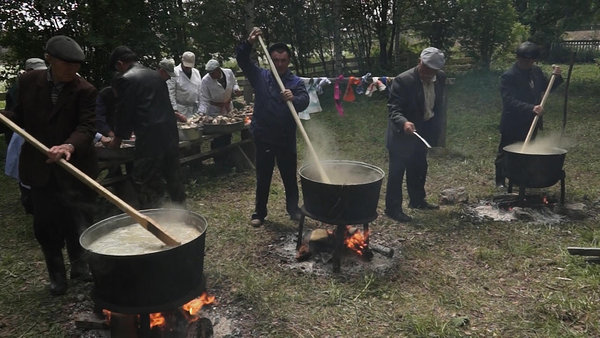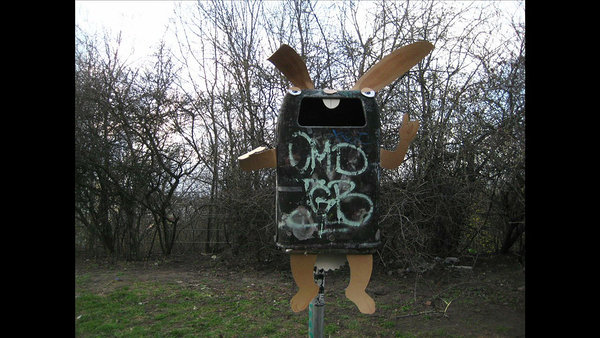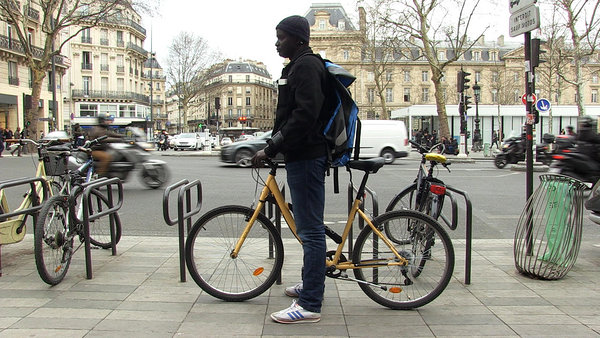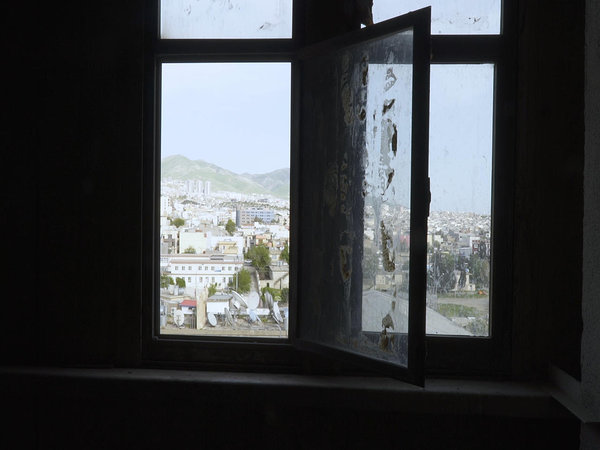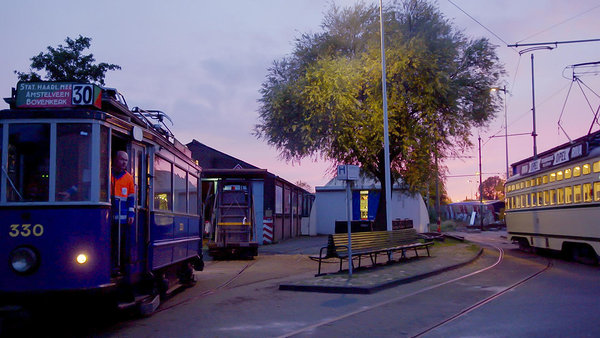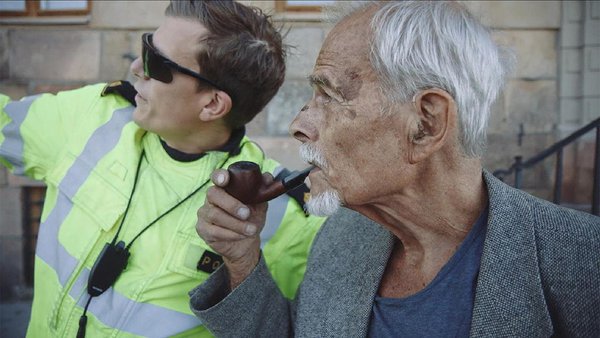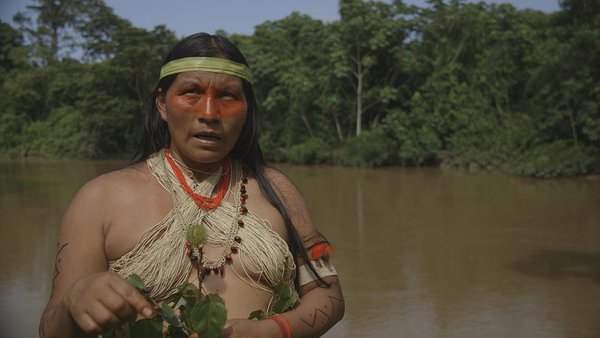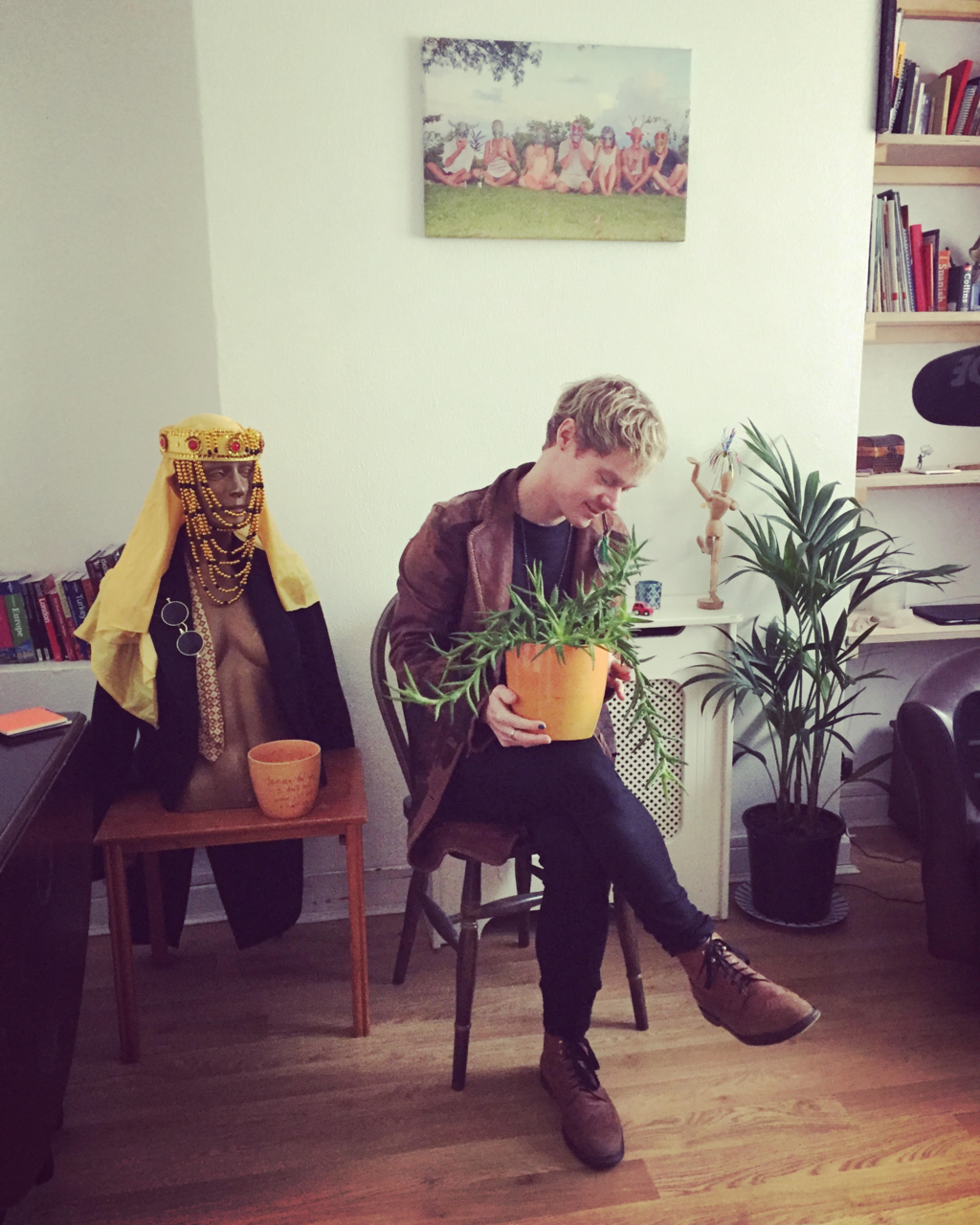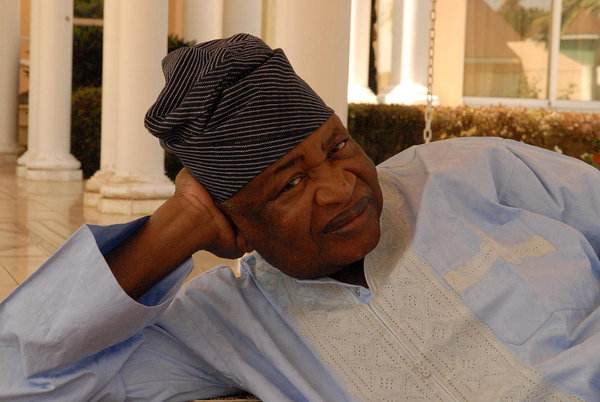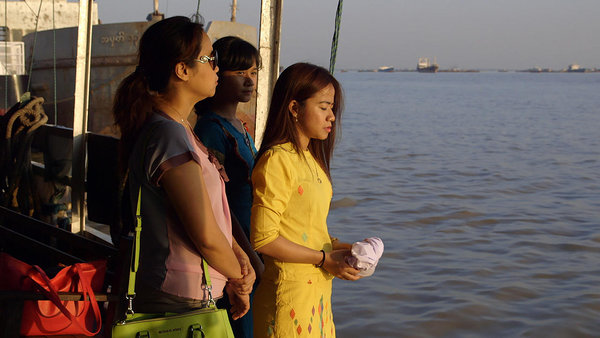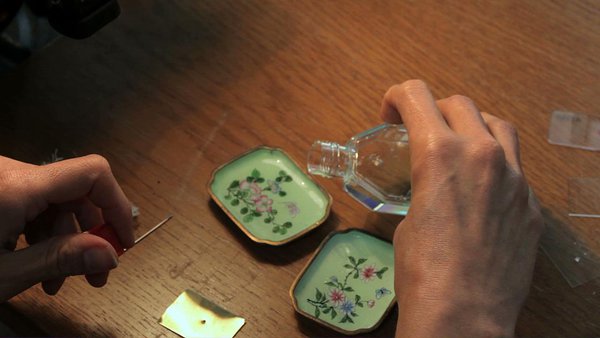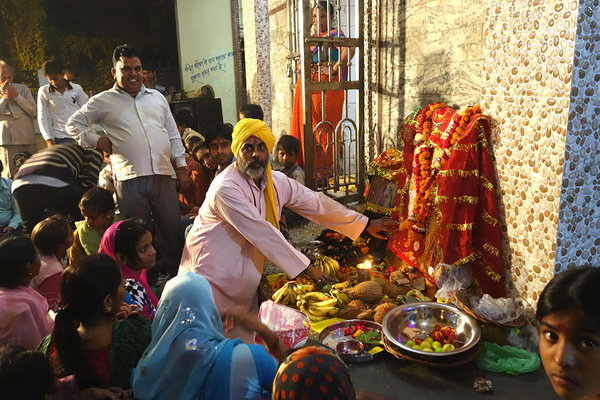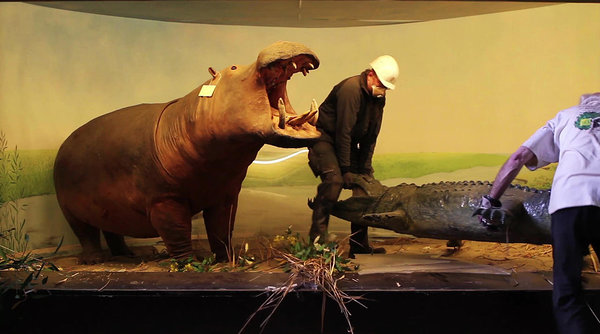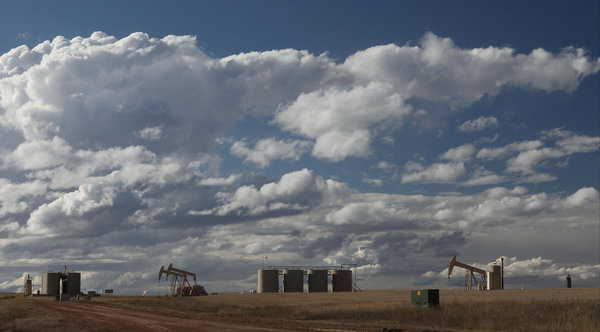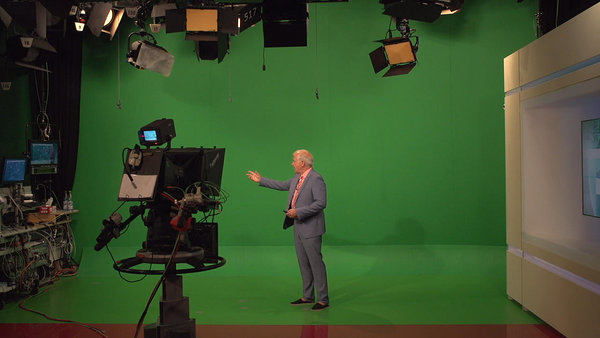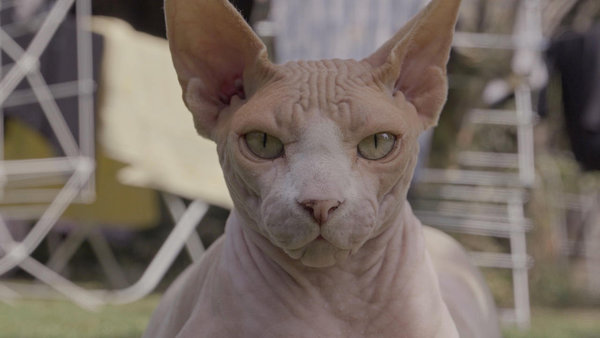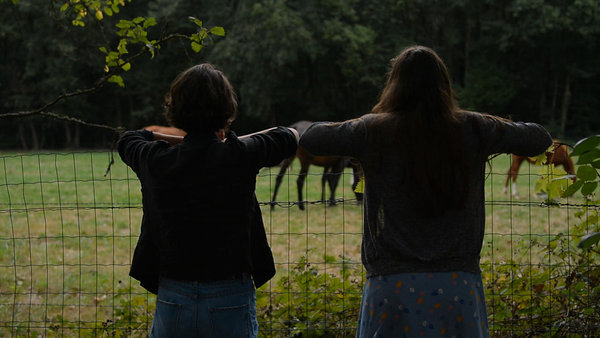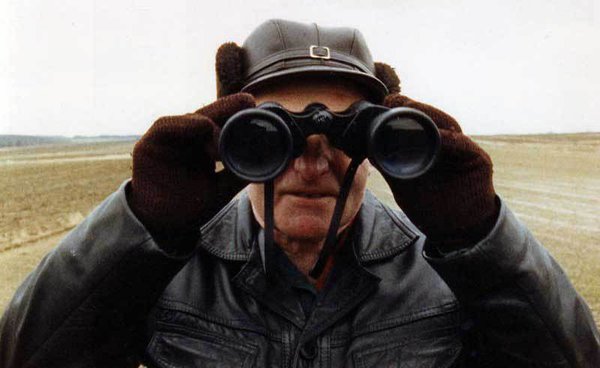CURRENT APPROACHES TO VISUAL ANTHROPOLOGY
The seminar has an academic approach and important part of it is the discussion about the films and their topics. So the screening is accompanied by a short presentation about the research and film(making).
Research / Souvenir (Dialogues)
- Year of release: 2018
- Duration: 18 min
- Director: Roger Horn
- Original Language: English
- Country of production: South Africa
- Shooting location: South Africa, Zimbabwe
"Research / Souvenir (Dialogues)", utilizes found Super 8mm footage from Rhodesia (Zimbabwe) and audio from ethnographic research gathered among Zimbabwean migrant women in Cape Town, South Africa. Part 1, "Research", reveals the personal thoughts and challenges faced by researcher/filmmaker Horn in the field. Part 2, "Souvenir (Dialogues)", offers the research participants an opportunity to question Horn about his choice of souvenirs from the field, providing the political and economic backdrop to the ongoing exodus of Zimbabweans and leads up to the removal of long standing President Robert Mugabe on November 21, 2017.
Director info
Roger Horn lectures in Visual Anthropology at the University of Cape Town; drawing upon his 19 years of experience across various disciplines and media outlets for inspiration. Additionally, Roger is currently pursuing his PhD in Visual Anthropology at the University of Cape Town where he continues to research and expand upon the material presented in his films on Zimbabwean migrants in Cape Town, "These Objects, Those Memories", “Migrant Dilemma”, and “Research/Souvenir (Dialogues)”.
Óshlíð: River Mouth \\ Slope - DIRECTOR IS PRESENT
- Year of release: 2018
- Duration: 28 min
- Director: Sarah Thomas, Jonny Randall
- Original Language: English, Icelandic
- Country of production: United Kingdom
- Shooting location: Iceland
This film takes us on a journey along Óshlíð - an abandoned coastal road considered to be one of the most dangerous, and beautiful, in Iceland. Following its replacement by a mountain tunnel in 2010, the road was closed and is now being reclaimed by the mountain and the sea. The film journeys into the stories of Óshlíð and its relationships with the people who maintained, travelled and died upon it. Through these voices it reflects upon the nature of mortality and inhabits a landscape where humans are not the main characters. The title embodies the topographical and compound nature of this film: Óshlíð is an Icelandic word comprised of ós (river mouth) and hlíð (slope). Óshlíð is both the name of the road, and the place - from which it came and to which it will return.
Director info
Sarah Thomas is a non-fiction writer and documentary maker with a background in anthropology. She is interested in dwelling deeply in a place, the stories we make and the relationships we have with the environments we live in. She has lived across the world in various locations from the Equator to the Arctic. Following the financial crisis of 2008, she lived in Island's Westfjords region for a number of years bearing witness to a period of immense environmental and social change, about which she is writing a memoir. She is doing a PhD in creative writing at Glasgow University. Jon Randall works as a north-minded freelance filmmaker and theatre practitioner primarily on youth, community and heritage projects and specialises in creating narrative-led documentary material for arts organisations and individuals across the North West of England. He is also the director of Alternative Outcomes, a theatre company exploring experiences of homelessness. Also, he has delivered short film and theatre-making projects for young people within schools and charities in Cumbria and Lancashire.
Remake of a Summer - DIRECTORS ARE PRESENT
- Year of release: 2017
- Duration: 96 min
- Director: Bragard Magali and Enjolras Séverine
- Original Language: French
- Country of production: France
- Shooting location: France
During a summer in Paris and its suburbs, two young directors attempt a remake of "Chroniques d’un été", fifty years after the cult film of Rouch and Morin. An offbeat portrait of nowday's youth, as a mirror image of the 1960s, while questions of the “cinéma vérité” are revisited with fancy.
Director info
Séverine Enjolras and Magali Bragard are both holders of a DEA in visual anthropology obtained in 2003 in Paris 10 - Nanterre, under the direction of Jean Rouch. In 2009 they co-directed a short documentary film, "Dombes", on the study and management of a health risk. They are both teachers in documentary cinema, they created and organized in 2007 and 2008 a festival of films in the West Bank. Séverine Enjolras has also directed several documentaries, institutional films and films around citizen consultation workshops. Magali Bragard, in addition to his work of realization, is also a stage and press photographer.
Mör vös: Joint Worship - DIRECTOR IS PRESENT
- Year of release: 2019
- Duration: 66 min
- Director: Liivo Niglas
- Original Language: Udmurtian
- Country of production: Estonia
- Shooting location: Russia
MÖR VÖS: JOINT WORSHIP This is one of the four films about religious practices of Udmurts living in Bashkortostan. Udmurts started to migrate to this region of mostly Muslim population in the 16th century when the areas around Volga River came under the Russian rule. Whole villages of Udmurts weary of taxes and violent Christianization fled from Kama River to the East, finding refuge at the Muslim Bashkirs and Tatars. Here no one forbade them from living according to the traditions of their ancestors, and around 20,000 local Udmurts continued following their religious practices without major interventions until the anti-religious campaigns of the Soviet rule. In some smaller and more remote villages, the joint worship tradition was preserved through the Soviet times. In the Tatyshlinsky District of the Bashkortostan Republic where Udmurts live in 19 villages located close to each other, even nowadays, a village worship takes place in the beginning of June in almost every village. A week later, ten villages situated on the right bank of the Yug River hold their joint sacrificial worship mör vös. For this, the priests of those villages gather to the village of Vilgurt to sacrifice a few sheep to the gods. Ritual porridge is cooked under the supervision of the priests, using the meat of the sacrificed animals and groats collected from the villagers. Part of the porridge is eaten on site during a common meal, the rest is shared between the inhabitants of all the ten villages. The film observes the preparations for the joint worship as well as the worship itself, focusing on the Balzyuga village’s young priest Friedman and his assistants - they are the main characters in all the four films.
Director info
Liivo Niglas is currently a research fellow at the department of ethnology in University of Tartu, Estonia. He runs an independent production company, Mp Doc, for anthropological documentary films. He has made films in Siberia, Africa, Central Asia and North America. Some of his works are: The Brigade (2000), Yuri Vella's World (2003), Adventure High (2004), Making Rain (2007), Fish On! (2008), Itelmen Stories (2010), Journey to the Maggot Feeder (2015), The Land of Love (2016).LOOKING FOR THE FUTURE
H is for Harry - DIRECTOR IS PRESENT
- Year of release: 2018
- Duration: 81 min
- Director: Ed Owles, Jaime Taylor
- Original Language: English
- Country of production: United Kingdom
- Shooting location: United Kingdom
A coming of age story about Harry, a charismatic 11-year old boy, who arrives at secondary school in suburban London unable to read or write. With the help of Sophie, his extremely dedicated teacher, can he overcome the illiteracy ingrained across generations of his family? Against the backdrop of a Britain riven with debates around class, identity and social mobility, the film follows Harry over two years as he fights not only to improve academically but also to believe in a different future for himself.
Director info
Ed Owles has shot and directed films across the globe for over a decade for broadcast, festival and online. Ed speaks Italian and Spanish and has filmed in over 20 countries around the world. He's an Associate Lecturer in Ethnographic Film at Goldsmiths and a member of the Royal Anthropological Institute's Film Committee. He has a 1st class degree in Social Anthropology from Cambridge and an MA in Visual Anthropology from Goldsmiths. He’s currently in postproduction on a short about creativity in Haiti. Jaime Taylor left a career in teaching in 2009 to make documentaries & co-found Postcode Films with Ed. She has also worked as a development producer with the BBC & Producer with Century Films on the Bafta nominated, RTS and double Grierson winning ‘The Secret History of Our Streets’. She worked for 4 years across both series of the critically acclaimed documentary, described in the Guardian as “wonderful...it prodded your brain awake as it broke your heart.”
Between Spaces
- Year of release: 2017
- Duration: 76 min
- Director: Stephanie Brewster Ramírez
- Original Language: English, German, Spanish
- Country of production: Mexico
- Shooting location: Germany, Mexico
Between Spaces is a documentary film that portrays an intimate journey into the ups and downs pertaining academic work. By following the everyday life of five young PhD students in Berlin and Mexico City - two contrasting, multicultural cities explored in the documentary. Between Spaces delves into these characters’ hopes and fears, into the personal motives that drive their academic work, while exploring how researchers in Social Sciences and the Humanities develop their own, unique creative processes and struggle to put them into practice. Between Spaces deals with how academic exchange between institutions and countries is, at its core, a complex form of cultural dialogue and, through our protagonists’ research topics, aims at discussing how global preoccupations — such as migration, gender violence, narcoculture, drug trafficking, human rights, and international cooperation — are shaped and lived locally in an interconnected world.
Director info
Stephanie Brewster (Mexico City, 1983) is a filmmaker, scriptwriter and documentary filmmaker. She studied her degree in Philosophy in the Universidad Iberoamericana (UIA) in Mexico with the aim to become a filmmaker. After this, she studied filmmaking in École Supérieure d'études Cinématographiques (L'ESEC) in Paris, France. She graduated with a film on love and sensuality in the elderly calle the Pleasures of age. Later on, she did a Masters in Communication studies in the Faculty of Political Sciences (FCPYS) of the National University (UNAM), in Mexico. Parallel to her studies, Stephanie has directed and done the cinematography for anthropological documentaries such as Urban Communities in Mexico City and Women and groups within others
Adrian
- Year of release: 2018
- Duration: 6 min
- Director: Tristen Bakker
- Original Language: English
- Country of production: Germany, Canada
- Shooting location: Berlin, Germany
Adrian faces her last night in her adoptive city of Berlin. A participatory documentary shot in one night
Director info
Tristen Bakker has worked in film for 20 years as a picture editor, documentarian and story teller and she has completed five of her own short films all documentary based. She has worked as a videographer, documenting bands and performances for magazines and her own YouTube channel fastermilesanhour.com.
The Absence of Apricots
- Year of release: 2018
- Duration: 49 min
- Director: Daniel Asadi Faezi
- Original Language: Burushaski
- Country of production: Pakistan
- Shooting location: Pakistan
A documentary fairytale about the struggle for identity in the Hunza Valley of Northern-Pakistan.
Director info
Daniel Asadi Faezi was born 1993 in Germany. At the age of 18 he spent one year in Kolkata doing social work against child labor for a NGO. After that he lived in Tehran to attend a language school. Since 2013 he is studying in the Documentary Department at University for Television and Film Munich and at National College of Arts Lahore, Pakistan. Since the age of 17 he directed 11 short films which were screened at over 100 film festivals including Locarno, Nyon, Tampere and Mumbai. He lived and worked in Munich, Kolkata, Tehran and Lahore and speaks German, English, Farsi and Urdu/Hindi.
URBANIZED
Big western cities are cosmopolitan locations, bringing together people, technologies, cultural and economic relations. They also reveal limitations, cultural and geographical divides, inequalities and lack of communication. Cities are both hosting culturally diverse neighborhoods, but also eliminating them, often driven by economic goals. These films are not abot the city: its infrastructure, urban planning, buildings or traffic, but rather about ’cities within a city’, exploring, how everyday life is shaped by or shaping the urban environment. It is a perspective of urban dwellers: idle passengers, lonely couchsurfers, guardians of the past, brave dreamers and new slave workers, connecting and disconnecting.
The Republic's Couriers
- Year of release: 2018
- Duration: 33 min
- Director: Badredine Haouari
- Original Language: French
- Country of production: France
- Shooting location: France
Ibrahim, Bathily, Martin... They don't live in Paris but La Place de la République is their meeting point. Across the city, always keeping an eye on their smartphone, these new kinds of workers ride through Paris following the orders of the applications.
Director info
Badredine Haouari studied cinema at the University of Montpellier and documentary film making at Les Ateliers Varan in Paris. He worked for 10 years on feature films as a costumer and assistant director. During his studies, he was particularly interested in “cinema direct” form of documentaries, especially Jean Rouch and Chris Marker's films. These films gave him the desire to direct as well. A Stranger on my Couch
- Year of release: 2017
- Duration: 53 min
- Director: Grzegorz Brzozowski
- Original Language: English, Polish
- Country of production: Poland
- Shooting location: Poland
What is the emotional price we pay for being mobile in the globalised world? Is it the loneliness that connects us despite the cultural differences? This is a documentary story of four interweaving meetings of members of internet hospitality network, formally inspired with the style of Jim Jarmusch. An image of a contemporary city from the couchsurfers’ perspective. Warsaw is becoming a meeting place for people from different corners of the world, of different ages, with different life stories. What they have in common is a feeling of being lost and a dire need to run away from their solitude.
Director info
Grzegorz Brzozowski graduated from documentary course at Andrzej Wajda Master School of Film Directing, studied also sociology, psychology and reportage at University of Warsaw, Utrecht Universiteit and Yale University. Now working on a Ph.D. at the Institute of Sociology at University of Warsaw, conducting a research on modern festival communities in Poland. He also works as an editor and chief of the film review section in “Kultura Liberalna” online weekly magazine.
Future Factory
- Year of release: 2018
- Duration: 15 min
- Director: Lana Askari
- Original Language: Kurdish
- Country of production: Iraq
- Shooting location: Iraqi Kurdistan
Future Factory tells the story of an abandoned cigarette factory in Silêmanî. Struggling to keep the site out of the hands of commercial contractors, Shaxawan, an arts teacher, dreams of turning the factory into an inclusive space for art, culture and experimentation for all inhabitants of the city. At the same time, Shad, an art student, has started a youth centre within the factory where he facilitates a space for play and creativity for young people. The factory provides its users with an escape from the crisis-ridden reality of the Kurdish region and opens up new imaginations about possible futures for the city.
Director info
Lana Askari is a PhD candidate in Social Anthropology with Visual Media at the Granada Centre for Visual Anthropology, University of Manchester. Trained in anthropology (MPhil Social Anthropology, University of Cambridge) and documentary filmmaking (MA Visual Anthropology, University of Manchester), her research and documentary films focus on topics of migration, future imaginations, and the anthropology of planning and infrastructure in Iraqi Kurdistan.
Harbour of the Past
- Year of release: 2018
- Duration: 19 min
- Director: Lotte Haase
- Original Language: Dutch
- Country of production: The Netherlands
- Shooting location: The Netherlands
An observational short documentary about one of the last undeveloped streets of Amsterdam: Harbour Street. In large warehouses people trade second hand goods, and renovate old objects and vehicles such as army trucks and antique trams. The film follows the 80-year old Loe, for whom Harbour Street is his daily habitat. But not for much longer. The warehouses must make way for flats. With pain in his heart Loe starts to clear out his workspace. Harbour of the Past is a film about future and past, keeping and throwing away, cherishing and letting go.
Director info
Lotte Haase is a visual anthropologist and documentary filmmaker. Her student film Dreams and Sacrifices was shown at several film festivals world wide. Besides working on her own documentaries she makes films for governmental organizations and social institutions, and she teaches film to children and university students.The Traffic Separating Devidce
- Year of release: 2018
- Duration: 15 min
- Director: Johan Palmgren
- Original Language: Swedish, English, German
- Country of production: Sweden
- Shooting location: Sweden
A traffic separating device is installed in the middle of Stockholm. It is supposed to keep normal cars away and only let buses pass. It turns into a disaster as normal cars continue to go there and hundreds of cars get destroyed every week. Tragic and funny situations occur and we follow the whole mess of human failures.
Director info
Johan Palmgren has worked on a large number of films for 20 years. He has won many prizes.
Rush Hour
- Year of release: 2018
- Duration: 80 min
- Director: Luciana Kaplan
- Original Language: English, Spanish, Turkish
- Country of production: Mexico
- Shooting location: Turkey, United States of America
Rush Hour narrates the parallel stories of three middle aged characters in these very complex cities: Mexico City, Istanbul and Los Angeles. They all share the fact of spending almost half of their life in public transportation or a car to go to work and back home. This situation complicates their personal life in several ways and makes them feel they’re loosing something essential that is not coming back. The film is told in different chapters as their conflicts evolve and they end up having some sort of epiphany as a resolution. It is time to confront their decisions so they can have a more fulfilling life. Is that possible?
Director info
Luciana Kaplan was born in Argentina but has lived in Mexico since 1975. She studied Film Directing at the Centro de Capacitación Cinematografica. She directed several documentary films and has also worked as a producer, assistant director and script supervisor on several feature, shorts, and commercials. She is the current director of the Post Production Documentary Grant Cuauhtémoc Moctezuma Ambulante as well as the Coordinator of the Documentary Program at The Centro de Capacitación Cinematográfica. LOVE FOR LIFE
About Love in a Small Island
- Year of release: 2018
- Duration: 26 min
- Director: Elaheh Habibi
- Original Language: Persian
- Country of production: Islamic Republic of Iran
- Shooting location: Islamic Republic of Iran
This ethnographic film is about romantic love, elopement, and marriage in a Muslim society. It’s also a journey through reflexions on women condition, an attempt to strip away beliefs, myths and prejudices about Muslim women. Following the everyday life of a man and his two wives in Qeshm Island, Iran, this film tells the story of cohabitant of two women and one man after a love relationship dramatically changed their life.
Director info
Is a graduate student of Visual Anthropology, University of Manchester and a journalist. Elaheh is a filmmaker and journalist based in Tehran, Iran. With a background of political science and women’s studies, she recently graduated from the University of Manchester in Visual Anthropology. She has written articles about women’s condition of life in Iran and worked for several established Iranian magazines and journals. She is particularly interested in how ethnographic filmmaking can be used as a creative medium to explore the variety of ways humans interact with their environments. A step without Feet
- Year of release: 2018
- Duration: 45 min
- Director: Lydia Schamschula, Jeremy Glaholt
- Original Language: English, German, Arabic
- Country of production: Germany
- Shooting location: Germany
A Step Without Feet is a documentary about connecting and sharing each others' cultures through universal themes like music, art, family, and friends. Within the backdrop of Berlins beautiful, winter landscape, we captured the daily lives of seven extraordinary Syrians exiled from their home country.
Director info
Lydia Schamschula is an actress, editor, and filmmaker. She studied acting at the School for Music and Performing Arts in Berlin, Germany. She spent the early part of her acting career
performing at theaters throughout Germany (Munich, Frankfurt Schauspielhaus, Bochum, and many more). After gaining experience in the world of theater, she brought her talents to the film world and is known for various German TV shows and films. A Step Without Feet is her debut film as a director.
In 2013, Jeremy Glaholt moved to Berlin, Germany where he directed and photographed his short film, Catch. He returned to Europe in 2014, to premiere Catch in Poland’s prestigious
cinematography festival, Camerimage. As a Cinematographer, he has traveled from the Brazilian Amazon and Favela’s of Recife, to the historic landscape of Berlin, Germany. His most recent film; Maya Blue (photographed for Artist/Director Clarissa Tossin), is being displayed in the Condemned to be Modern showcase in his home town of Los Angeles. The show is part of the Getty Foundations PST: LA/LA. His reputation continues to grow based on his keen eye for composition and lighting, artistic viewpoint, and dedication to his craft.
Mister Kubota
- Year of release: 2018
- Duration: 54 min
- Director: Anush Hamzehian, Vittorio Mortarotti
- Original Language: Japanese, English
- Country of production: France
- Shooting location: Japan
Mr. Kubota studies the immortal jellyfish, with the purpose to discover how humanity can live forever. Mr. Kubota is searching for eternity, because at the end of the day he is terribly afraid to die. And so he decided that he would not die at all.
Director info
Anush Hamzehian (1980) and Vittorio Mortarotti (1982) have always dedicated their work to social and geographical marginalities. During the last few years, they directed projects in Byelorussia, Japan, Armenia, United States, Italy and Belgium where they related stories of political refugees, former miners, prostitutes, survivors from tsunamis and Balkans wars. Their documentaries have been selected in international festivals such as Marseille Primed and Filmer le Travail de Poitiers (Filming Poitier's Work), the Ushuaia SHH. The Last of the Popstar
- Year of release: 2017
- Duration: 45 min
- Director: Carlo Prevosti, Stefano Zoja, Claudio Casazza
- Original Language: Italian
- Country of production: Italy
- Shooting location: Italy
A film that is born from the chronicle of a great event, waiting for a moment of great intensity and involvement. It is an observational look focused on the people of the faithful who have come to see and hear the Pope: a million people who slowly arrive at the park, who alone in large groups, picnics, games to deceive the time, the songs and prayers of children and adults. At times it looks like a playground: music, often out of context, floods the human tide appointed. The waving scarves that look like those of a soccer team. A film of humans, some of them in respect, prayer, others simply waiting, between photos and selfies to remember and share. A film about the religion of today that never contemplates silence.
Director info
Carlo Prevosti began in 2010 with the documentaries “Con le ruote per terra (With both my wheels on the ground)” telling the approach of the Italian national under 22 of prams basketball to the European Championships and “Sentire il mio passo sul sentiero (Feeling my step on the path)” that instead collects testimonies of people who have chosen to abandon their life urban to ripopolare the mountain, in 2013 has made Movement for 21 pianos on the work of master Daniele Lombardi and in 2013 was one of the authors of Capulcu - Voices from Gezi.
Stefano Zoja is a journalist and filmmaker, one of the directors of “Capulcu - Voices from Gezi”. He was the author of the documentary “Appunti sulla sabbai (Footnotes on the Sand)”, a humanitarian project story led by a team of psychologists in the Johannesburg slums, and has collaborated as author and technical roles in several other social and documentary films and videos.
Claudio Casazza recently presented the documentary “Un altro me (Another me)” shot in the
prison of Bollate. He was previously the author of documentaries. “Era la città dei cinema” (2010), a look at the story of the cinemas in Milan and “Habitat [Piavoli]” (2013), a portrait of director Franco Piavoli presented at the Torino Film Festival. In 2013 he was also one of the authors of “Capulcu - Voices from Gezi”
Pierino
- Year of release: 2018
- Duration: 68 min
- Director: Luca Ferri
- Original Language: Italian
- Country of production: Italy
- Shooting location: Italy
One year exactly, from January 1st till December 31st. For fifty two Thursdays, from 10:30 am till 11:30 am I have met Mr Pierino Aceti in his house, he is a man of fixed habits, strongly passionate about cinema, he is now retired after a white - collar life. I have been asking him always the same question: “What have you done this week?”. The surprising result comes from the organisational structure of his days, his infallible memory and the relentless passage of time between our formal meetings.
Director info
Luca Ferri (Bergamo, italy, 1976) works on images and words. Self-taught, since 2011 he has been dedicating to the writing, photography and direction of films presented to Italian and international festivals. His first feature film Abacuc, released in 2015, was presented at Torino Film Festival and Mar del Plata Festival de Cine. The film Colombi was presented at 73rd Venice festival in the Orizzonti section. In 2018 his last work Dulcinea is selected at 71st Locarno film festival in competition in the section Signs of lifeBottoms Up
- Year of release: 2018
- Duration: 75 min
- Director: Brunella Fili
- Original Language: Italian
- Country of production: Italy
- Shooting location: Italy
Nick is a 48 years old food-performer. He narrates stories to the audience while cooking and listening to the music. The philosophy of his cooking-show rests on a belief that “food is the essential component of the mechanism that drives economy, culture and health”. Health, exactly. In February 2015 Nick was diagnosed with cancer. At that time his career was blooming; his life replete with work, friends and long term plans. From that moment everything was going to change. Can one be happy despite being gravely ill? He posed this question to himself, after being diagnosed with the Non-Hodgkin lymphoma: his disease became a challenge to find his own “recipe for happiness”. Eventually, he will discover that there are various ways in which one can adapt to a disease; that his body is like an elastic band and that happiness is very often a “personal recipe” and therefore different for every one of us; that one can feel happy even while lying on a hospital bed. It is a recipe that has to do not only with fate, but also with one's own willpower.
Director info
Director and author, born in Bari. Having completed secondary school focused of humanities, she enrolls at the University of Bologna, where she obtained her Bachelor's degree in Communication studies and her Master's degree in Cinema. She participated in directing and script-writing workshops as well as in those dedicated to photography and production. In Milan and Bari she starts her career as a filmmaker. After winning the Principi Attivi competition – in 2013 – Brunella founds, together with her team, an independent production house based in Apulia.
ART KEEPS US ALIVE
The Nation - DIRECTOR IS PRESENT
- Year of release: 2017
- Duration: 65 min
- Director: Julia Mironova
- Original Language: Russian, Udmurtian
- Country of production: Russia, Finland, Netherlands
- Shooting location: Udmurtia
This story is about a small ethnic group from the North of Udmurtia, Russia called Besermyan. In the times of Soviet Regime the nation was officially reduced and dissolved among Udmurts and Russians. The only specific feature remains – their unique way of singing called Krezh. Maria Korepanova a folklore singer tries to preserve the Nation collecting, singing and spreading Krezh around the world. Another character – the Besermyan activist Valerian Sabrekov tries to remind the fellow tribesmen who they are. This is a documentary about the world’s tendency of ethnic minorities to disappear. It is a humorous story of a non-humorous question about national identity in our globalizing world.
Director info
Julia Mironova (b 1977) was born in the city of Abakan, the Khakas Republic. In 1999 she graduated from the Khakas State University, the Romanic and Germanic Philology Department. In 2007 she graduated from the Saint-Petersburg State Academy of Art as a film director. From 2005 till nowadays works as TV program director.Jamilia
- Year of release: 2018
- Duration: 84 min
- Director: Aminatou Echard
- Original Language: English, Russian
- Country of production: France
- Shooting location: Kyrgyzstan
The film sets off in Kyrgyzstan, in search of the main character of Tchinghiz Aitmatov's novel. "Djamilia", written in 1958, brings us across the country to meet several generations of women who tell us about Djamilia, a young woman who breaks the rules of Kyrgyz society. Doing so, these women release an intimate word, reveal themselves, and tell us about their dreams, love, desires, and freedom.
Director info
Aminatou Echard studied of Ethnomusicology and cinema. As an artist who works with experimental film and documentary, Aminatou's focus is how space transforms people and how people inhabit spaces. She conveys this idea by exploring the relationship between sound and image. Fieldwork is a crucial element in her artistic practice. After four years of working in Bolivia in ethnomusicology, she has started a new stage in Central Asia (Kyrgyzstan, Uzbekistan and Kazakhstan) in 2006 by collecting images and sounds to gain an understanding of the specific relationship between spaces and people. Mr. Finne's Reality Tunnel - DIRECTOR IS PRESENT
- Year of release: 2018
- Duration: 47 min
- Director: Henrik Edelbo
- Original Language: Danish
- Country of production: Denmark
- Shooting location: Denmark
After graduating from the Royal Danish Academy of Fine Arts in 2005, Christian Finne was making a living selling his intricately detailed psychedelic artwork. The financial crisis of 2008 hit the art market hard and now he is forced to live at his artist's studio. While working on his first solo museum exhibition he is struggling to get by. The film follows Finne's artistic explorations into the depths of his psyche and the patterns of the universe trying to get back on his feet.
Director info
Coming out of the skateboarding community Henrik Edelbo has moved on from his teenage passion for making skateboard films and has for the last 13 years been working as a cinematographer and cameraman in documentaries, TV, commercial films and music videos. His directorial debut Mr. Finne's Reality Tunnel premiered at CPH:DOX 2018.Mother's Balls - DIRECTOR IS PRESENT
- Year of release: 2018
- Duration: 48 min
- Director: Catherine van Campen
- Original Language: Dutch, English
- Country of production: Netherlands
- Shooting location: Netherlands
Mother’s Balls portrays Amber Vineyard, born in the United States and now living in Amsterdam, founder of the first Dutch ballroom house ‘House of Vineyard’. This ballroom is not about quickstep, fox trot or Viennese waltz, but about Vogue Fem, Runway and Sex Siren. Amber grew up in a strict American family where her creative outbursts were frowned upon. After she moved to The Netherlands with her mother at age 15, ballroom became a way for her to express herself. With her extravagant dance performances as Mother of the House of Vineyard, Amber not only gives her ‘kids’ the chance to express themselves and build up their self-esteem, but is also instrumental in putting ballroom and voguing on the international map.
Director info
Catherine van Campen (1970) lives and works in Amsterdam where she studied at the University of Amsterdam (history). She’s a documentary filmmaker and her documentaries have been screened worldwide (Moma New York, Berlinale, Hot Docs, Visions du Réel, Idfa,). For her films she received ten’s of prices, among them awards at Hot Docs, IDFA and Visions du Réel.LOSING AND FINDING EDEN
While wild spaces were once condemned as the opposite to lush and organised Garden of Eden, at some point they became the same. Not only ecologists idealise it as an redemptive realm, but the whole civilisation is looking to nature as a locale of recovery and renewal. But is there wilderness any more? And what about the Tree of The Knowledge of Good and Evil ? There are contested spaces, indigenous people fight for, in order to survive. There are domestic urban jungles of the urbanized young, there are failed relationships instead of co-species inhabitance. But we have to find it ourselves, in different forms.
Spears From All Sides
- Year of release: 2018
- Duration: 90 min
- Director: Christopher Walker
- Original Language: Spanish
- Country of production: United States of America, Ecuador
- Shooting location: United States of America, Ecuador
Since the arrival of the Spanish conquistadors, Ecuador’s Waorani tribe, have defended their Amazon rainforest with spears. In the 1950’s American missionaries cleared the way for oil companies to enter Waorani lands. Now, 70% of Ecuador’s Amazon, home to some 12 tribes, has been divided into oil blocks, polluting one of the most bio diverse rainforests of the planet. Only one small tribe, the Waorani, have successfully fought to keep oil off most of their land. Now, Ecuador has started to auction off the Waorani’s last virgin rainforest to the international oil industry – including the Yasuni National Park, thought to contain more species per acre than anywhere else on earth.
Director info
Christopher Walker is a multi award-winning producer, Director of documentaries for international television. Over the past ten years he has produced and directed current affairs reports around the world. Subjects include land rights in Brazil, tobacco in Malawi, famine in Southern Africa and Mexican migration to the U.S. for the LIFE series, political change in Eastern Europe, Central America, Africa and South-East Asia. He was executive producer and associate producer of numerous documentaries on international affairs. He has also produced and directed two documentaries for the United Nations Population Fund on immigration and health issues ,and a documentary on Vitamin supplementation for UNICEF.
Islander
- Year of release: 2018
- Duration: 92 min
- Director: Stéphane Goël
- Original Language: French, Spanish
- Country of production: Switzerland
- Shooting location: Chile
Robinson Crusoe is a small island hundreds of kilometres away from the Chilean coast where in 1704 the Scottish sailor Alexandre Selkirk lived the incredible experience that inspired Daniel Defoe's same name novel. In 1877 the island becomes the property of a young Swiss aristocrat, Alfred von Rodt, a confirmed optimist, a tireless explorer and an indisputable rebel who multiplied projects in hopes of developing the resources of his piece of rock. Islander dives us into nowadays' Robinson Crusoe's reality. Its inhabitants are not Chilean, nor Swiss, but they are strongly attached to their identity and reject everything coming from the "outside" - animals, plants and people. This is a film about an utopia of a dream-like life based on the "purity" of its inhabitants and environment. It is a strong and cinematic metaphor of nowadays societies' self-centredness based on fear.
Director info
Born in 1965 in Lausanne, Switzerland. Has worked as an editor and independent director since 1985. Lived and worked in New York between 1987 and 1993. Directed several artistic and experimental videos before moving on to full-fledged documentaries.
Lukomir, my home - DIRECTOR IS PRESENT
- Year of release: 2018
- Duration: 62 min
- Director: Manca Filak, Žiga Gorišek
- Original Language: Bosnian
- Country of production: Slovenia
- Shooting location: Bosnia and Herzegovina
Lukomir is the village with the highest altitude (1472 m above sea level) in the Federation of Bosnia and Herzegovina. Despite the outward migration of the population and the increase in tourism in the last decades the transhumant pastoralism remains one of the main economies in the villages of Bjelašnica. Transhumance and seasonal migration of families and their flocks of sheep characterize the life of their residents. The life of the villagers could roughly be divided into a summer life on Bjelašnica and a winter season in lower settlements in the vicinity of Sarajevo. Lukomir. The film portrays a visual ethnography of an older couple’s everyday life.
Director info
Manca Filak and Žiga Gorišek are active in the field of visual anthropology since 2011. They both finished postgraduate study of Ethnology and cultural anthropology at the University of Ljubljana (Slovenia). They are part of the festival Days of ethnographic film in Ljubljana and Summer school for visual ethnography at Slovene science research center. All their films were screened at various (ethnographic and documentary) film festivals around Europe. Their work is presented under the name Ethnocinema production.Green with Empathy
- Year of release: 2018
- Duration: 23 min
- Director: Aime Dorsett
- Original Language: English
- Country of production: United Kingdom
- Shooting location: United Kingdom
Are houseplants being elevated to the status of pets? This light-hearted film is curious of the relationships between multispecies and the unlikely companionships that can blossom even between a human and a cactus. Urbanites close relationships with their pets are well-known, but how do they feel about their houseplants with whom they also share a home? Do empathy, care and love extend to such species usually deemed disposable or even edible? Imagine for a moment if such empathy could also be extended to the wider environment and the positive impact this could have.
Director info
Previously from the field of marketing, as a mature student I entered a whole different field, that of anthropological fieldwork. As a Visual Anthropology MA student fresh out of Goldsmiths, I’m keen to share with the public the incredible human, and indeed wider species’ stories that I’ve learnt. Such fascinating academic knowledge deserves to be enjoyed by the many, not the few. And film is the perfect medium for this. I like grounding my storylines with real-life tales working in close collaboration with the key characters. It’s light-hearted viewing, with a deeper message. Whether that be a film on our beloved houseplants with a deeper environmental message, or a film that asks who takes the driving seat in a deeper look at gender roles. I believe anthropological filmmaking is the future, in which I hope to play a part in the making of.Animals and Other People
- Year of release: 2017
- Duration: 89 min
- Director: Flavio Marchetti
- Original Language: German
- Country of production: Austria
- Shooting location: Austria
Animals and other people introduces viewers to Vienna's animal shelter and its inhabitants. The encounters between human and animal and the individual stories and peculiarities are affectionate, sometimes sad, and then again, strange. A tender gaze at the nature of the animals and a critical look at human irresponsibility.
Director info
Flavio Marchetti, born 1980 in Rome (Italy), studied first Law at the Universitá Roma Tre and after moving to Vienna attended the Film production Class of the Vienna Film Academy (Austria). 2010 founded the production company La Banda Film. Between 2013 and 2015 worked as production Manager for Nikolaus Geyrhalter Filmproduktion. Animals and Other People is his directing debut.
NAVIGATING THROUGH GLOBALIZATION
The Chateau - DIRECTOR IS PRESENT
- Year of release: 2018
- Duration: 113 min
- Director: Lisbet Holtedahl
- Original Language: French, Fulfulde
- Country of production: Norway
- Shooting location: Cameroon, France, Italy
A portrait of one of the richest Cameroonian industrialists Al Hajji Mohamadou Ousmanou Abbo. Filmed over a period of more than ten years. The red thread of the story is the construction of Al Hajji’s spectacular palace on the outskirts of his native town, Ngaoundéré in Northern Cameroon. The camera follows Al Hajji on various arenas in France, Italy and Cameroon. We learn about his relationships and negotiations with the local population, European artisans, who work on the construction site of his palace, his business partners in the country and abroad as well as local, regional and national authorities and politicians. Through a portrait of this man, Al Hajji Abbo, as well as through his “love-hate” relationship with his European partners, the film tries to grasp the equally ambivalent and complicated relationship between the rich and the poor and between the Global North and the Global South.
Director info
Lisbet Holtedahl was born in 1946 in Copenhagen, educated in Oslo and Paris (history of art / anthropology). Professor of anthropology and the founding mother of the Visual Cultural Studies (VCS) Master's programme at UiT, the Arctic University of Norway in Tromsø. In 1992 she created the inter-university collaborative program Ngaoundéré-Anthropos between the University of Ngaoundéré in Cameroon and UiT, the Arctic University of Norway. Since 1970 visual ethnographic research in Eastern Niger, Northern Norway and Northern Cameroon.Eastern Memories - DIRECTOR IS PRESENT
- Year of release: 2018
- Duration: 86 min
- Director: Niklas Kullström, Martti Kaartinen
- Original Language: Mongolian, Japanese, Chinese, Korean
- Country of production: Finland
- Shooting location: Mongolia
Eastern Memories is an unexpected road movie into the Far East of Mongolia and Japan. Seamlessly intertwining the past and the present into a visually stunning journey of adventure and exploration, love and death, conspiracies and the fall of nations. All told by a dead Finn from the distant north. Finnish linguist and diplomat G. J. Ramstedt travels into the age old world of beliefs and traditions of the late 19th century, a world replaced today by ideologies and market economy. He witnessed the events of the past one hundred years, now reminding us of why we are here today.
Director info
Niklas Kullström is a producer, director, cinematographer and media artist who has graduated with a BA in aesthetics from the University of Helsinki and with an MA in photography from Aalto University. Films Kullström has worked on include the short documentary “Say Hello in Slovio”, the short film The Dijon Story by Mikko Myllylahti, and the feature documentary In Praise of Nothing by Boris Mitic. His art has been internationally displayed at several different venues, most notably at the Hamburg Photography Triennial in 2015.
Martti Kaartinen is a Finnish filmmaker and scriptwriter. He has acted as a lead in short films, which have been shown at major festivals and broadcasted on tv. Background research for the documentary “Eastern Memories” took Kaartinen for a month to Tokyo, for six months to Mongolia and for several weeks to China, travelling and living alone with the local people. He is currently involved in several different film projects as a director, writer and an actor. As a journalist Kaartinen has written articles ranging from social to cultural issues, and done photoreports for various publications. “Eastern Memories” is Kaartinen’s debut film as a director.Myanmarket
- Year of release: 2017
- Duration: 75 min
- Director: Eva Knopf
- Original Language: Burmese, German
- Country of production: Germany
- Shooting location: Myanmar
Until recently Myanmar was shut off from the rest of the world by a military dictatorship. Today investors view the country as "the last frontier" of globalization. Myanmarket explores how the Burmese navigate through a time of change, new economic opportunities and traditional values.
Director info
Eva Knopf is a documentary film maker and film scholar. She studied directing at the Filmakademie Baden-Württemberg and Cultural Anthropology as well as Media Studies in Göttingen, Amsterdam and Berkeley. In her films she examines the effect of global events on the life of individuals and tells personal stories that challenge prevailing perceptions. Eva teaches at the department of Visual and Media Anthropology at Freie Universität Berlin. For many years Eva has worked as a film projectionist in different art house theatres.ANTHROPOLOGY OF THE SENSES
A focus on the senses has become a key theme in contemporary anthropology, according to anthropologist Sarah Pink. Seeing, hearing, taste and smell and touching, noticing manual practices, lack or abundance of sounds, light and darkness – this program foregrounds the importance of perception in our understanding of the world and conditioning cultural life and social relations, as well as „avenues for the transmission of cultural values“ (Constance Classen).
Sun Cream
- Year of release: 2017
- Duration: 10 min
- Director: Aylin Gökmen
- Original Language: English
- Country of production: Switzerland
- Shooting location: Hungary
A blanket transforms into a castle, a swamp becomes quicksand: the world is a playground for 5 and 6 year olds, Morné and Carey. “Sun Cream” is a dual travel: a trip to the forest for these children and a time travel for the viewers, who are transported back to their own childhood.
Director info
Aylin Gökmen is a Swiss-Turkish director who holds a BA in Philosophy and Literature from the University of Lausanne. In 2016, she was awarded a scholarship to study documentary filmmaking in the Erasmus Mundus DocNomads program, from which she graduated in July 2018. Over the past two years, she directed several short documentaries and collaborated on films in many different countries. Combining documentary and experimental approach, her works revolve around the themes of nature, imagination and childhood and have been screened in international film festivals. She is currently developing her next film, a creative animated documentary.
Wool - DIRECTORS ARE PRESENT
- Year of release: 2018
- Duration: 14 min
- Director: Daniel Edward Allen, Patrick Tubin McGinley
- Country of production: Estonia
- Shooting location: Estonia
Wool is a short film that looks at, and listens to, the machines in an unmodernised wool mill in south Estonia. We learn a little about the process that turns raw wool into yarn and observe the two men who work in the factory, although this is neither a process nor a biographical film. Rather it focuses on the sensory experiences that are possible in this space, showing machinery and methods that could soon fall into disuse in a country that is striving for progress.
Director info
Daniel Edward Allen is originally from the UK and is from a photography background. His interest is in experimental forms of photography, especially analogue, and he is active in promoting this, as well as experimental film, in Estonia. He has given various workshops in this field, and has had photography exhibited and published in Estonia and abroad.
Patrick Tubin McGinley is an American-born sound, performance and radio artist, who works specifically with location and field recording in both documentary and abstracted form. He has recorded and designed sound for a number of films, released many albums of compositional work under the moniker Murmer, and produced Framework Radio, a program for the field recording community, for over 15 years. Both now live in Estonia where they are involved in sound, photography and more mainstream film individually, and experimental film collectively. Wool is their second film together and forms part of an on-going series that investigates Estonia as a regenerating post-occupation society.
Every Tear
- Year of release: 2017
- Duration: 30 min
- Director: Sarah Vanagt
- Original Language: Dutch
- Country of production: Belgium
- Shooting location: Belgium
In the 17th century, Antoni Van Leeuwenhoek, a draper from Delft, begins to make glass lenses, in order to better study the quality of his textile. He melts, drips and grinds small beads of glass. His tiny lenses are so bright and have such magnifying power that the draper seems to have entered a new dimension. Is he the first to see little moving ‘animals’ in a drop of water? How to describe something that nobody ever saw before? In the film Every Tear, Sarah Vanagt starts a journey into her home city of Brussels, with Leeuwenhoek’s microscope in hand. She picks up bits and pieces on her road, and tries to find out what the first microscopic images may have looked like. She replaces the lens of her camera by the 17th-century lens. As she is filming, she wonders why we always look for shapes that we already know, whenever we are in the eye of the unknown.
Director info
Sarah Vanagt (1976) makes documentaries, video installations and photos, in which she combines her interest for history with her interest for (the origins of) cinema. Her work is shown at film festivals, and in museums. Vanagt's most recent film Alle de tranen / Toute larme / Every Tear had its international première at Visions du Réel (Nyon, Switzerland) in April 2018.
Niishii | Night Worlds
- Year of release: 2017
- Duration: 22 min
- Director: Saranya Nayak
- Original Language: Bengali
- Country of production: United Kingdom
- Shooting location: India
What happens to a town after sunset? Set in Dubrajpur (India) during the summer monsoons of 2017, this ethnographic film attempts to capture the essence of the semi-urban night in a small town from its pre-electrification years as a village before 1958 to its radically altered present state. Traversing the realms of experience, imagination and memory, it presents the night as a distinctly active and affective space and time distinguished by the lightscapes and soundscapes uniquely crafted, altered and negotiated by its people.
Director info
Saranya Nayak is a visual anthropologist and filmmaker hailing from Kolkata, India. Her recent film, photography and mixed media projects have been inspired by all manner of things perceived and imagined while travelling from and living in New Delhi, Manchester, Kolkata and London. Her aims are to create socially significant research-backed fiction that can generate a closer understanding of the often-invisible dynamics that shape modern society, including deep-rooted notions of caste, class, family and gender roles. Saranya has an MA in Visual Anthropology from The University of Manchester. For the past five months, she has worked as an Assistant Director to award-winning filmmakers Kaushik Ganguly and Churni Ganguly for their upcoming Bengali language feature film projects. A Kali Temple Inside Out - DIRECTORS ARE PRESENT
- Year of release: 2018
- Duration: 83 min
- Director: Dipesh Kharel, Frode Storaas
- Original Language: Hindi
- Country of production: Japan, Nepal, India
- Shooting location: India
Religious boundaries are not necessarily as sharp and antagonistic as the news media lead us to believe. This film shows the everyday life inside and around a Kali temple in the city of Kanpur, Uttar Pradesh, India. The temple building houses a Kali shrine and a smaller Hanuman shrine, and visitors to the site present offerings in both. Through a closer presentation of a priest and three devotees, the film shows why this temple is so important to them. Yet they also occasionally visit holy places of other religious traditions, whether to learn or seek additional divine support. The film is thus a silent critique against the obsession with religious conflict in contemporary debates.
Director info
Dipesh Kharel is a visual ethnographer and filmmaker. Currently he has a post-doctoral fellowship at Sophia University, Tokyo, Japan. He has already produced several award-wining ethnographic films, notably A Life with Slate (2006) and Playing with Nan (2012) and Tama Gaun (2015) those have been screened at more than 60 international film festivals around the world and won several prizes.
Frode Storaas is a professor in visual anthropology at the University Museum of Bergen, Norway. His research has mainly been based on fieldwork in East Africa. As a filmmaker he has worked in several countries. Among his award-winning films are 'Tama Gaun – the Copper Village', Nepal, (together with Dipesh Kharel), Making Rain, Mozambique, (together with Liivo Niglas), Our Courtyard, China, (together with He Yuan Wang), Fish On!, USA, (together with Liivo Niglas).
Kitchen Triptych - DIRECTOR IS PRESENT
- Year of release: 2018
- Duration: 90 min
- Director: Marko Raat
- Original Language: Estonian
- Country of production: Estonia
- Shooting location: Estonia
‘A day in the life’ of the kitchens of some of Estonia’s top restaurants.
What happens in the engine room of a restaurant once you’ve placed your order?
This film shows us the ‘hidden places’ where diners rarely go, with all the stress and passion that goes into making great food. Who does what and where and how in an often cramped room at 35 C. When and what do chefs eat, what are their thoughts about restaurants, food, food fads and fashions, money – and life. Why do they do the job they do?
Toomas Lääts, Rene Uusmees, Dimitri Demjanov, Dmitri Rooz, Märt Metsallik, Ott Tomik – six head chefs shown simultaneously on a 3-way split screen. Watch 90 minutes on screen, get four and a half hours of exciting action!
Director info
Marko Raat (1973) graduated film school in Tallinn. He has made as author documentaries, full lenght features, video art works, shorts, TV productions, directed in theatre and has been involved in several art and museum projects. His most resent documentary “Funeral Diaries” (2019) was the opening film of DocPoint FF Tallinn.WE ARE THE HUNTERS
Diorama
- Year of release: 2018
- Duration: 35 min
- Director: Matthias De Groof
- Original Language: Dutch
- Country of production: Belgium
- Shooting location: Belgium
In the course of its renovations, Belgian’s colonial museum – or better: museum of colonialism) ceases to exist. One of the pinnacles of this transformation is when the museum staff destroys the very dioramas they used to guard for decades. The violent destruction forms an allegory of museological and ecological relations. Not only the dioramas are demolished, but also a colonial worldview. What remains are the dead animals staring at you amidst ecocide.
Director info
Dr. Matthias De Groof has a strong interest in film theory and film making, Congo and (post)colonialism. He is a master in Philosophy (KUL), International Relations (UCL) and Cinema Studies (UA). He studied African Studies at UMU (Uganda) and became a Fulbright and BAEF visiting scholar at NYU’s Tisch School of the Arts. His PhD in Cinema Studies looked at African cinema through the oeuvre of Cameroonian filmmaker Jean-Pierre Bekolo. He studied postcolonial film theory at the Antwerp University where he also teaches World Cinema, Aesthetics (Philosophy of Art) and Curating & Exhibiting. He is regularly asked to talk and write in non-academic contexts and to curate film programs.
The Game
- Year of release: 2018
- Duration: 53 min
- Director: Marine de Contes
- Original Language: French
- Country of production: France
- Shooting location: France
From the shelter of their cabin, hunters scan the autumnal sky in the Landes region of south-west France. Meticulously and patiently, they listen to the rustling of the forest, eagerly watching for the wood pigeons to fly overhead. In a strange choreography, they pull on the cords of their trap. Everything is in place, though all around them, as pine trees are cut down, the landscape as they know it is being destroyed.
Director info
Marine de Contes is a French filmmaker and editor who has been living and working in Bordeaux, Buenos Aires, Madrid and Paris where she is currently based. She has shown her work at several festivals internationally. Marine De Contes has studied languages at the University of Bordeaux, documentary filmmaking in Buenos Aires and editing at Madrid Film School (ECAM) in Hispaania.King of Beasts
- Year of release: 2018
- Duration: 86 min
- Director: Tomer Almagor, Nadav Harel
- Original Language: English, Swahili
- Country of production: United States of America
- Shooting location: United States of America, United Republic of Tanzania
Aaron, an American hunter, enters the dark heart of the African bush, on a surreal neocolonial expedition, emulating 1000s of years of indigenous rite of passage rituals, as he hunts the ultimate trophy - the king of beasts. Many hunters consider themselves conservationists, and animal lovers. They justify their right to hunt as central to the preservation of the species and defend the benefits of their concession fees. King of Beasts is an observational portrait that digs deeper, beyond sensationalism and politics, observing the facts and the many shades of the truth on the ground in Africa, in regards to wildlife and lion conservation efforts, amidst the ever declining animal populations. With intimate access and never before seen footage, the film question man’s very nature, as well as our place in the animal kingdom.
Director info
Tomer Almagor was born in Israel and has traveled extensively, Tomer’s short film played festivals and won awards. He wrote and directed the feature film 9 Fulll Moons with Amy Seimetz, Bret Roberts and Donal Logue. Based out of Los Angeles, he is an accomplished screenwriter and the creative director at Urban Tales, where he has been developing a slate of films.
Nadav Harel is an award-winning documentary filmmaker based in Israel. Nadav’s shorts and TV work screened worldwide in high venues.
The Last Ice Hunters
- Year of release: 2017
- Duration: 82 min
- Director: Jure Breceljnik, Rožle Bregar
- Original Language: Danish, English, Inuktitut
- Country of production: Slovenia
- Shooting location: Eastern Greenland
Merely 4500 people inhabit East Greenland’s 20 000 km long coast. It is one of the least populated places on our planet. Due to the isolation, the area remained unknown to outsiders. Only in the last five generations, the modern world entered East Greenland. The local environment created one of the most specialized hunting cultures in the world. There are few places on Earth where humans suffered more hardship and coped with such an extreme hostile environment. The hunter is the pillar of society in these areas, but nowadays the status of the hunter as the economic basis of the society has been severely undermined. The 2009 EU ban on seal fur trading was intended to curb the overkill of seal populations by big hunting industries. But it has also hurt the economic foundations of Inuit societies.
Director info
In 2009 Jure Breceljnik founds a production house Film IT and trough it films 8 documentaries, 7 of them are being bought and showed by the national television of Sloveenia. 2012 he finishes his first feature documentary Wild One for which he received several awards on film festivals. After Wild one movie his opus comes to a beautiful documentary movie Terra Magica about Goriška Brda, a region in the western part of Sloveenia where wine has been cultivated even before the Romans. Unfortunately Jure suddenly died in the summer of 2015 while he was filming his last documentary The Last Ice Hunters.
Rožle Bregar is a co-founder of audio-video production Vizualist, started in 2008. Group of young ambitious and creative people, who joined together by the passion of motion picture enriched with sound in a different, unique style. He filmed several documentaries, mostly in Slovenian mountains. Rožle has been director of photography at many commercials and corporative films. He also made several tourisms promotional videos. Lately he has been heavily involved in documentary filming and production, primarily as a DOP but also as a director. As a DOP he has received the Slovenian national recognition “Iris award” for the best cinematography in a documentary project. After the death of his colleague Jure Breceljnik in 2015 he takes over as the director of his last project.
RESOURCES: POLITICS OF CARE
Paani. Of women and water - DIRECTOR IS PRESENT
- Year of release: 2018
- Duration: 23 min
- Director: Costanza Burstin
- Original Language: Hindi
- Country of production: United Kingdom
- Shooting location: India
Women against water shortage. An ethnographic documentary that explores the peculiar relationship between women and water in a small village of Rajasthani desert (India). In such a context, albeit water scarcity represents a real and severe problem in terms of daily maintenance, health and sanitation, local women tackle this daily struggle with tenacity, determination, elegance and sometimes humor.
Director info
Costanza Burstin is an Italian Anthropologist and Documentary Filmmaker. She studied Anthropology and Development Studies at the School of Oriental and African Studies in London. After having work for a period on gender and environmental impact in India, she specialized on Visual Research and Filmmaking at Goldsmiths University. Recently, she has been worked on a visual ethnographic project about the interaction among women, water and natural resources in a desert rural community in Rajasthan (India). From Seed to Seed - DIRECTOR IS PRESENT
- Year of release: 2017
- Duration: 87 min
- Director: Katharina Stieffenhofer
- Original Language: English
- Country of production: Canada
- Shooting location: Canada
When Terry and Monique left the opera to pursue their true passion – ecological farming – their story of community and resilience took center stage. We follow their young family and a diverse group of farmers and scientists as they blend age old traditions with cutting edge science to develop improved methods for growing food ecologically and in a changing climate.
A hopeful story and Canadian perspective on a global social movement that regenerates the land, farming and communities to grow a healthier and truly sustainable future for all of us.
Director info
Katharina Stieffenhofer is a Winnipeg documentary filmmaker with a passion for ecological agriculture, healthy communities and social justice. Her love of Nature and appreciation of farmers is rooted in her childhood & youth growing up on a mixed family farm on a Rhine island in Germany and expanded when her parents immigrated to Canada to become grain farmers in Southern Manitoba. Katharina obtained a Fine Arts Degree from the University of Manitoba (1996) and exhibited nationally and internationally during her 16-year visual art practice. In 2001 she began working in the Manitoba film industry and has worked on ~ 45 films in various capacities in the art department. The Illuminators
- Year of release: 2017
- Duration: 68 min
- Director: Antti Haase
- Original Language: English, Finnish
- Country of production: Finland
- Shooting location: Finland
The story of a Baltic German refugee who became the father of light to Lapland. Filmmaker Antti Haase takes us on a personal journey, learning about his fathers’ legacy. Baltic German refugee Gunnar Haase arrived in Finnish Lapland in 1945 to repair the destruction left by his compatriots after World War II. Antti’s father Hannu continued grandfather Gunnar’s mission to bring electricity to Lapland - the powerlines finally reaching the very last Lapland home on the 23th July,1987. Rural electrification was an enormous undertaking; it brought modern life and equality to people still living in the harsh nature. And while the undertaking took a heavy toll, it also illuminated the way forward. The Illuminators is an inspiring story about courage and social progress as well as sons following in their father’s footsteps.
Director info
Antti Haase (b. 1972) grew up in the neighborhood of Santa Claus in Soome Lapland. In the late 1990s he studied and worked in Australian film industry and received Film Australia Documentary Award for his AFTRS graduation documentary Clown Doctors (2000). After migrating back to Finland Antti has directed several documentary films set in his native Lapland. Citizen Science Revolution - DIRECTOR IS PRESENT
- Year of release: 2018
- Duration: 62 min
- Director: Martin Andres Balestrini
- Original Language: Albanian, Catalan, Dutch, English, Spanish
- Country of production: Spain
- Shooting location: Kosovo, Netherlands, Spain
Can a low cost sensor change the reality of a city? And dozens of them? In the spring of 2016, different groups of citizens in Barcelona, Pristina and Amsterdam concerned about noise pollution, air quality and gamma radiation in their neighborhoods begin to collect data with low cost sensors to measure the scope of their problems and try to Look for solutions. At first, governments do not recognize the data as valid because they do not come from official sensors. But the revolution of citizen science is unstoppable.
Director info
Martín Andrés Balestrini was born in Argentina, now resides in Barcelona, Spain. He works in audiovisual production, editing and post-production since 2001, after he finished his studies on Film direction. During his stay in México, he worked 3 years in the production and editing for the public television making a weekly TV program.The most relevant of this time, was the production and editing of more than 50 documentary reports on the professions of people. In synch with audiovisual production, he taught cinema and audiovisuals (documentary, fiction, editing and post production) for 5 years in two universities. In 2016 he finished his first feature documentary discovering connections between deaf-blindness and the development of consciousness. He is currently working as an audiovisual producer on a European project on environmental sensors and citizen participation.
Teddy Roosevelt and Fracking
- Year of release: 2017
- Duration: 30 min
- Director: Pamela Falkenberg, Jack Cochran
- Original Language: English
- Country of production: United States of America
- Shooting location: United States of America
An experimental documental essay, Teddy Roosevelt and Fracking explores the beauty and fragility of the North Dakota, Wyoming, and Montana landscapes, contrasting the vastness and stark loneliness of the relatively untouched wild areas with the terrible beauty of the oil derricks, fracking towers, natural gas burn offs, coal mines, machinery, trucks, energy installations, and energy towns -- visual evidence of the recent boom and bust economy that echoes the cattle boom and bust of the 1880's.
Director info
Pamela Falkenberg is an independent filmmaker who received her PhD from the University of Iowa and taught at Northern Illinois University, St.Mary's College, and the University of Notre Dame. She directed the largest student film society in the US while she was at the University of Iowa, and also ran films series for the Snite Museum of Art in South Bend, IN. Her films include museum installations, scholarly/academic hybrid works shown at film conferences, and a documentary commissioned by the Peace Institute at the University of Notre Dame. Pam wants to make all kinds of films with Jack, but she is particularly proud of having suggested that his poems should be made into films, and collaborating on bringing them to life.
Jack Cochran is an independent filmmaker who has produced, directed, or shot a variety of experimental and personal projects. As a DP he has extensive experience shooting commercials, independent features, and documentaries. Jack was trained at the University of Iowa Creative Writers Workshop as well as the University of Iowa film studies program. Jack has been writing poetry all his life, but never knew what to do with his poems, until he showed his notebooks to Pam, who said, “You’re a filmmaker — why shouldn’t they be films?”
TRUTHS, LIES AND SILENCES
3 Stolen cameras
- Year of release: 2017
- Duration: 17 min
- Director: RåFILM & Equipe Media
- Original Language: Arabic
- Country of production: Sweden
- Shooting location: Western Sahara
The members of video activist group Equipe Media, from occupied Western Sahara, fight to keep their cameras. This is a story about breaking an absolute censorship with unique footage from an area where the Moroccan authorities have managed to implement a near total media blockade.
Director info
RåFILM is a Swedish collective of filmmakers that connect film and activism. Through collaboration we facilitate the production of films that address social issues and have a critical approach.
We do documentaries, animations and fiction film in different formats, organize campaigns and work with educational projects. Over the years our work has been screened and awarded at festivals around the world and broadcasted on TV.
Factory of Lies
- Year of release: 2018
- Duration: 59 min
- Director: Jakob Gottschau
- Original Language: English, Russian
- Country of production: Denmark
- Shooting location: Russian Federation, Sweden, United Kingdom
Russia has launched an information war - introducing a new weapon. Hundreds of young Russians are producing fake news from socialled „Troll Factories“. From fake profiles lies are spread by social media in US and Europe, trying to impact the public opinion. But some brave Russian journalists are fighting back. Meet them in the documentary: „Factory of Lies“.
Director info
Jakob Gottschau is a Danish documentary filmmaker. He has in recent years produced several films in which he has examined whether social media are a tool for democracy and liberation or for control and powerabuse. He has been in Egypt in 2012 - the year after the January Revolution, and in 2013 he visited China to explore the democratic debate on Weibo (the chinese Facebook). By 2015 he investigated Facebook's censorship policy and handling personal data. And in his latest movie from 2018 - The factory of Lies, he portrays the infamous trolley factory in Saint Petersburg, Russia where 3-500 employees spread lies and false news in other countries.
The Effect of Cannonry on Thunderclouds
- Year of release: 2017
- Duration: 30 min
- Director: Juliane Jaschnow, Stefanie Schroeder
- Original Language: German
- Country of production: Germany
- Shooting location: Germany
Waves, storms and tornadoes are heading for Germany — everybody knows this, the weather forecasters, YouTube and games developers. The climate scenario becomes a lot of hot air, data sloshing everywhere, shitstorms or floods of refugees. (Lust of) fear everywhere. A filmic attempt to mediate between troposphere and trope.
Director info
Juliane Jaschnow studies in photography at the HGB Academy of Visual Arts in Leipzig, communication and media sciences at Leipzig University. Studies of photojournalism at the Lomonosov Moscow State University, DAAD scholarship.
Sterfanie Schroeder studies art education, art history, communication science in University of Greifswald. Guest student in media art, HFG Karlsruhe. Exchange student at Villa Arson, Nice.
Impreza - The Celebration
- Year of release: 2017
- Duration: 75 min
- Director: Alexandra Wesolowski
- Original Language: Polish
- Country of production: Poland, Germany
- Shooting location: Poland
The whole family is preparing for Danuta’s and Maciej’s golden wedding. In honour of this occasion Alexandra, their German niece, visits Warsaw. Right away politics engross their conversations and it soon becomes clear that all Polish relatives support the measures taken by the right-conservative PiS government. All of a sudden Alexandra is left alone with her liberal views and regarded as a victim of Western propaganda.
Director info
Alexandra Wesolowski was born in Poland in 1985 and grew up in Germany. She studied Political Science at the Friedrich-Alexander-Universität in Erlangen. She has been studying Directing at the University of Television and Film Munich since 2008. Alongside her studies she became a fellow of the Leo-Kirch-Foundation for Media Art and worked as a lecturer and concept developer.Silence is a Falling Body
- Year of release: 2017
- Duration: 75 min
- Director: Agustina Comedi
- Original Language: Spanish
- Country of production: Argentina
- Shooting location: Argentina
Jaime recorded everything, even his own death. From him, her daughter received more than one hundred hours of home videos and many uncertainties. Because as many people of his generation, Jaime was a clandestine person. But in his case, probably two times clandestine. The images recorded by Jaime, resignify to give place to questions around desire, sexuality, family and freedom. "Silence is a Falling Body" is the trip to a intimate and filial past, but also to a political one.
Director info
Agustina Comedi, (Córdoba, Argentina), 1986. She studied Modern Literature and Technique in Correction of Style at the UNC. She moved to Buenos Aires and attended the script workshops of Pablo Solarz for three years. She collaborated in the writing of "Juntos para siempre" (2011) by Pablo Solarz. She is the author and screenwriter of "La vuelta en cuento" (2015), an animated Tv series for the Argentinian kid´s Channel Paka Paka. At 2017, she premiered her first documentary feature "Silence is a Falling Body" at IDFA. She works as a teacher of the Audiovisual Workshop at the Popular Bachelor Raymundo Gleyzer, consulting audiovisual projects. She is writing her next film.Unsettling
- Year of release: 2018
- Duration: 70 min
- Director: Iris Zaki
- Original Language: Hebrew
- Country of production: United Kingdom, Israel
- Shooting location: West Bank
Tekoa is a trendy hippie colony for Israeli settlers on the West Bank, where none of the controversial residents want to speak to the media. From the moment filmmaker Iris Zaki arrives, tension fills the air. She sets up a small pop-up film studio in the middle of the small town, and stays put for over one month in order to meet the young settlers face to face. A simple intervention, which creates a complex chain of reactions from those who eventually agree to talk to her. From a woman who in the middle of an interview admits to being a fascist, to another who has survived a knife attack by a young Palestinian – and has forgiven him. Unsettling is made by Iris Zaki alone as a social experiment that highlights the contrasts and contradictions of the settlers' self-perception, but which does so in something as rare as an active conversation with them. A conceptual ploy that places Zaki's film in the field between artistic practice and political activism, and which reaches beyond blind criticism.
Director info
Dr. Iris Zaki is a Grierson award-winning documentary filmmaker and researcher. She recently finished her PhD at Royal Holloway, London, which explored her innovative interviewing technique: The Abandoned Camera. Her previous film, Women in Sink׳ screened at over 120 festivals, received 13 awards (at Karlovy Vary, Visions du Reel, Films de Femmes and more), and featured on TV and on NY Times.
The White World According to Daliborek
- Year of release: 2017
- Duration: 107 min
- Director: Vít Klusák
- Original Language: Czech
- Country of production: Czech Republic, Slovakia, Denmark, UK
- Shooting location: Czech Republic
Daliborek is an industrial painter, amateur horror maker, angry songs composer and a radical neo-Nazi. He is approaching 40, but he still lives with his mother. He hates his job, gypsies, Jews, refugees, homosexuals, Merkel, spiders and dentists. He hates his life, but he doesn’t know how to change it. The turning point is when his mother starts new romance, and Daliborek decides to finally find his first love. The experiment is set to investigate and change the situation of lonely man, after he devoted his life to hate and lie. Tragicomedy about lives of “decent ordinary Czechs” who miss Hitler.
Director info
Vít Klusák (1980) is a Czech film director. Together with Philip Remunda, he founded and since 2003 has been directing the film company Hypermarket Film, which focuses on producing documentary films and does not produce advertisements on principle. Klusák graduated from the Department of Documentary Film at FAMU. Since October 2006, he has been a lecturer at FAMU, the Faculty of Documentary Film. In his films, he systematically returns to the tension between creation and society. His first film was a documentary comedy "Czech Dream" (2004), which he made with Filip Remunda. The film was awarded at many festivals at home and abroad and broadcast by 24 television stations around the world. Apart from directing, he also works as a cinematographer and an editor.
THINGS THAT MAY HAVE HAPPENED
Curupira, creature of the woods
- Year of release: 2018
- Duration: 35 min
- Director: Félix Blume
- Original Language: Portugese
- Country of production: Mexico
- Shooting location: Brazil
Deep in the heart of the Amazon, Tauary inhabitants invite us to listen to the sounds of the jungle, the birds, and animals. However, some weird sounds appear: a creature prowling around the trees. Some of them have heard her, very few have ever seen her, and those who did find her never came back. She charms, she enchants — she leads people to get lost: each of one of them tells a story in their own way and tries to decipher her sounds. Curupira, creature of the woods… takes us in search of this being: a reflection about myths and their place in the contemporary world. It’s a sound thriller in the midst of the jungle.
Director info
Félix Blume (Narbonne, France, 1984) is a sound artist and sound engineer. He currently works and lives between Mexico and France. His personal work is based on field-recordings using sound as a basic material, in sound pieces, videos, actions and installations. He works with communities in the public space. In his pieces, he blurs the line between sounds and music by changing noise in sounds that eventually sheds a new light on the perception of the surrounding sounds. The particularity of his work is that the audio and visual aspect are closely intertwined. As a sound collector, he has a large sound library recorded from different parts of the world that he freely shares on the Internet. He has participate in exhibitions in Spain, Mexico, Chile, France, Germany and Belgium.
Histories of Wolves
- Year of release: 2018
- Duration: 23 min
- Director: Agnes Meng
- Original Language: Portugese
- Country of production: Portugal
- Shooting location: Portugal
This film is a collection of stories related with wolf in north Portugal mountains. At one peak among rocky ranges, there is a village called Pitões das Junias. At nightfall hour, shepherds used to gather and tell stories. Myth, death, killings…things might or might not happened but inspired by internal fighting between human and wolf, between us and the wild.
Director info
Agnes Meng is a documentary filmmaker and cinematographer. She graduated from School of Journalism and Communication in Tsinghua University; and “Docnomads” Erasmus Joint Master that involve study at Universidade Lusófona in Lisbon, University of Theater and Film Arts in Budapest and LUCA School of Arts in Brussels. Agnes has a background in filmmaking, journalism and anthropology, she worked as anthropology research assistant in south west China and Tibet. Her first short documentary Histories of Wolves premiered at 25th Hot Docs Canadian International Documentary Festival.
The Mermaid Kingdom
- Year of release: 2017
- Duration: 75 min
- Director: Luis Rincón
- Original Language: Spanish
- Country of production: Mexico
- Shooting location: Mexico
In a fishing community of Nicaragua divers are getting sick. They descend to the sea looking for lobster and return to the surface with the body paralyzed. Without an explanation for a disease never before seen in the community, the old men spoke out to indicate that divers had raised the anger of the mermaid.
Director info
Born in Mexico in 1981, Luis Rincón presents his third feature documentary. With this project, he was part of the Latin America Media Arts Fund of the Tribeca Film Institute. He has specialized in research and development of audiovisual projects of a documentary nature. He has been awarded with the Program to Encourage Cinematographic Creators, granted by the Mexican Institute of Cinematography.
WE STILL HAVE BODIES
Pain, skin, face, food. „We still have bodies“ is a collection of shorts from ethnographic explorations to artistic interpretations. Or rather, a set of films on the psychology of body, self-identifications and self-awareness through the means of bodily existence. Glimpses, which make us aware, but not neccesarily knowledgeable.
Carlotta's Face
- Year of release: 2018
- Duration: 5 min
- Director: Valentin Riedl, Frédéric Schuld
- Original Language: German
- Country of production: Germany
- Shooting location: Germany
As a child, Carlotta didn’t expect the people around here to have faces. She even doesn’t recognize her own face. Years later, she learns about a rare, untreatable deficit of her brain. It was art, after all, that offered her a way to finally recognize herself.
Director info
Frédéric Schuld studied at the Academy of Media Arts in Cologne and founded the studio Fabian&Fred with Fabian Driehorst in 2011. He mainly works as a director and animator on short films, animation and documentaries. In 2014 Fabian&Fred received the scholarship of the Wim Wenders Foundation for the development of their first animated feature. In 2018 he finished his first animated short film as a director The Chimney and as a co-director Carlotta’s Face.
Broken Skin - DIRECTOR IS PRESENT
- Year of release: 2018
- Duration: 25 min
- Director: Lidija Burcak
- Original Language: English
- Country of production: United Kingdom, Switzerland
- Shooting location: United Kingdom, Italy
An emotionally charged poetic encounter between the filmmaker and other psoriasis sufferers on behalf of yet another 125 million people around the world who are silently enduring the secret pain of a very visible yet hidden disease. The film explores skin as a metaphor of strength, belief, belonging and alienations…a determined attempt of a healing journey.
Director info
Lidija Burcak is a visual anthropologist born 1983, a so-called Yugo (Swiss-born with Yugoslav parents), multilingual, studied at Goldsmiths University in London (MA) and Social Sciences in Zurich and Berlin (BA), worked as a journalist and as script supervisor, handles small talk & in-depth conversations very well. Currently based in Zurich and London.Beyond Pain
- Year of release: 2018
- Duration: 30 min
- Director: Emanuele Lami Grifeo
- Original Language: English
- Country of production: Germany
- Shooting location: Germany
Beyond Pain is a documentary with fictional scenes, describing pain in some of its forms. Xenia is one of the Berlin Staatsballett dancers. Jan is a psychoanalyst and photographer. John, twenty years ago, due to his HIV infection, went into a coma and lived a Near Death Experience.
The three stories cross each other throughout the film, combining a documentarist approach with a cinematography and a dialectic typical of feature film. In the background, like a mirror for reality check, Berlin - ugly and fascinating as only real life can be.
Director info
Emanuele Lami Grifeo (b 1983) is Italian film director and screenwriter born in Rome and based in Berlin for 12 years. Emanuele graduated in International Economics in Rome
and moved to Berlin to study photography. He started his creative career as freelance photographer working mostly in the publishing industry in Germany, Italy and South Africa. His personal projects have won several international awards, such as Leica Talent and Kolga Awards and were exhibited around the world for venues and art fairs such as 2011 Venice Biennale of Art. Emanuele was also nominated for the World Press Photo Masterclass.
Currently, he is writing two long feature films and working on his first novel.
Thinking Bodies
- Year of release: 2017
- Duration: 22 min
- Director: Catherine Boutaud
- Original Language: French
- Country of production: France
- Shooting location: France
"I write to you in a breath. My life, it can fly away if I do not fight. Against me, against this wind. With you, I could brave storms. For you, I could brave storms. Because tomorrow I do not know where I will be, in a breath, I send you all my love. I hope the wind will prevail ... " My sister is 15 when she writes these words to me. She suffered from anorexia. Ten years later, we come back to this period of our life which has deeply connected and marked us.
Director info
Catherine Boutaud (b 1986 in France). She has obtained a degree in applied arts (2007) from the LISAA school (Nantes, France) and from the ARCO art school in the Cinema and Motion Picture department (Lisbon, 2011). She lives and works between Paris and Lisbon, dealing with documentary film and graphic design. DISAPPEARING BOUNDARIES
Is it easy to be young?
- Year of release: 1986
- Duration: 80 min
- Director: Juris Podnieks
- Original Language: Latvian
- Country of production: Latvia
- Shooting location: Latvia
Portrayal of rebellious teenagers growing up under Communist rule in Latvia. Several young fellows wind up on trial after smashing a train carriage as they are returning from the rock concert, others become examples of “punks” who view Soviet reality as “upside down”. A sixteen-year-old girl accused of stealing tries to commit suicide by jumping out a window in a police station. A young man becomes an amateur filmmaker making a Kafkaesque avant-garde film, while another youth becomes a follower of the Hare Krishnas.
Director info
Juris Podnieks was born in Riga, Latvia in 1950. He graduated from the celebrated Soviet film school, VGIK, in 1975. He went to work at the Riga Film Studio, first as assistant cameraman, then as cameraman before finally becoming a director in 1979. His first production the "Cradle" won a prize at the Leipzig Festival, and shortly afterwards "The Brothers Kokar" took first prize at the Kiev Youth Festival in 1981.Losses to be expected
- Year of release: 1992
- Duration: 118 min
- Director: Ulrich Seidl
- Original Language: German, Czech
- Country of production: Austria
- Shooting location: Austria
The widower Sepp Paur lives in a small Austrian village on the border to Czechia. The meals that his late wife has left in the freezer are slowly running out. It's time for Sepp to look around for a new spouse. He looks across the border, where the widow Paula lives. Two people, two neighboring villages, and in between? The border. That's what this film is about. But not only that. It's also about the loss of borders, the loss of homeland, the loss of youth, the loss of love. Losses to Be Expected is seen by many as one of Ulrich Seidl's most tender films.
Director info
Ulrich Seidl, born 1952 in Vienna (Austria), is a director, author and producer. Ulrich Seidl started his career with award-winning docmentaries such as “Good News” (1990), “Animal Love” (1995) and “Models”.
King of the Airs
- Year of release: 2016
- Duration: 78 min
- Director: Ivo Zen
- Original Language: German, English
- Country of production: Switzerland
- Shooting location: Switzerland
Martin indulged in his excessive use of drugs. He recorded his frenzied life in his diaries while his friend Ivo passionately captured everything on film with his Super 8 camera. Both sought for the absolute – average was not an option. Through the lens of this journal, Ivo Zen tells the story of his generation, a story about friendship and the desire to fly higher than anybody else.
Director info
Ivo Zen was born and raised in Santa Maria, in the Val Müstair. He left the remote valley at the age of 15 to go to high school in Chur. After a somewhat turbulent gap year, he enrolled to study architecture at the ETH in Zurich, where he became acquainted with video and photography. He quit after two years and worked in a bookstore. During this time he started making experimental films. He began his Super 8 film journal in 1996. Ivo Zen graduated from the Geneva film school in 2003. The following year he co-founded the independent production house Alva Film. He gave several workshops in documentary filmmaking at the University of Art and Design (HEAD) in Geneva. In 2010 he became president of the group “Cineasts independents rumantschs”, promoting the interests of Romansh filmmakers. He has twice been the recipient of the Graubünden canton’s grant for artists. Ivo Zen is married and lives in Zurich with his wife and two children.